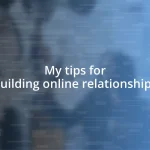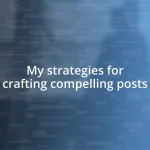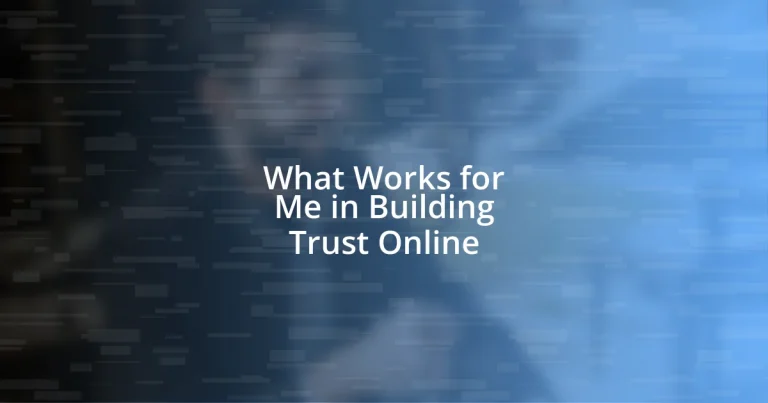Key takeaways:
- Building online trust relies on social proof, transparency, and emotional connections with brands.
- Engaging consistently and authentically with your audience fosters a strong sense of community and loyalty.
- Demonstrating expertise through real-world experiences and being open about successes and failures enhances credibility.
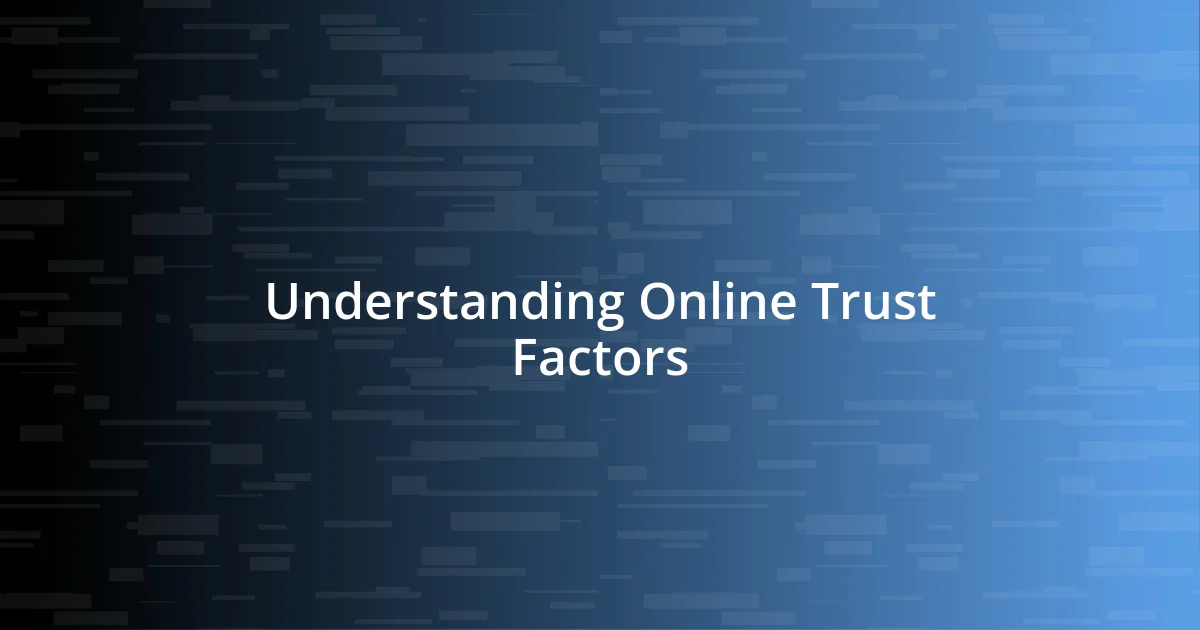
Understanding Online Trust Factors
When I think about online trust factors, I immediately remember a time when I purchased something from a site that seemed sketchy. The lack of customer reviews made me pause—how could I trust this platform? It hit me hard that social proof, like testimonials, plays a crucial role in instilling confidence in potential buyers.
Another key factor for online trust is transparency. I once interacted with a brand that openly shared their return policy and contact information. This openness made me feel safer and more valued as a customer. Have you ever noticed how a clear, accessible privacy policy can elevate your comfort level with an online service? It’s like the brand is saying, “We respect you, and we’re here for you,” which I find immensely reassuring.
Finally, don’t overlook the emotional connection we build with brands. I remember feeling genuinely drawn to a company’s story about sustainability and its social impact. This connection sparked a deeper trust in me; I didn’t just care about the product, but also about the values behind it. Isn’t it fascinating how shared values can transform a simple transaction into a meaningful relationship?
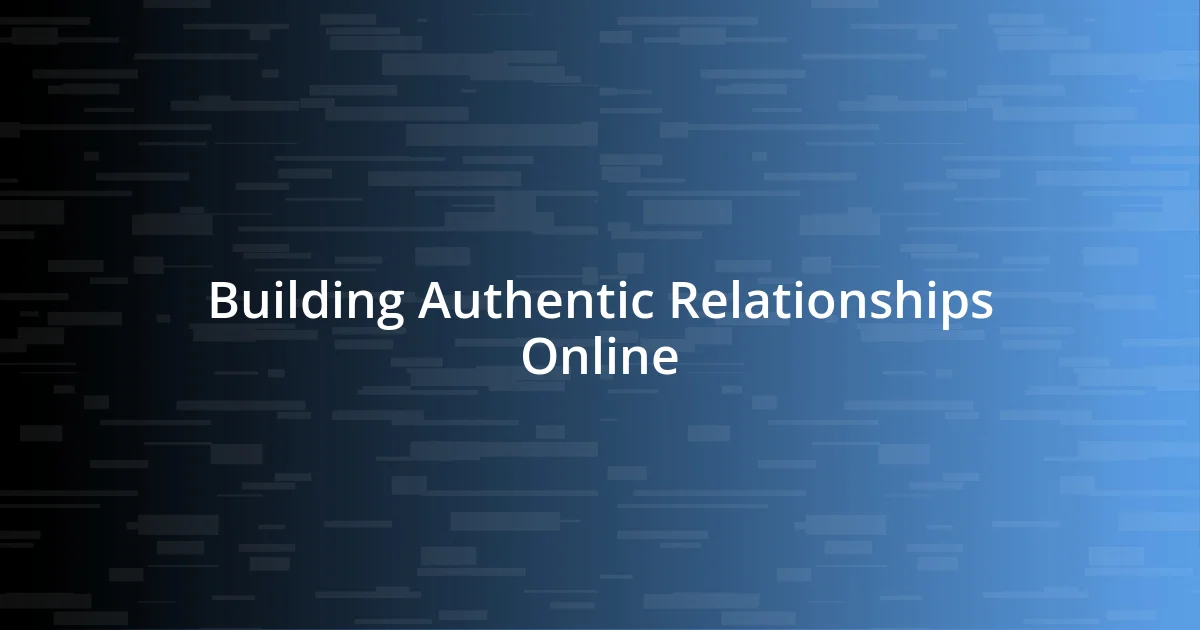
Building Authentic Relationships Online
Building authentic relationships online requires a sincere approach. I recall joining an online community where the members genuinely supported one another, sharing personal stories and experiences. This openness fostered a sense of belonging, reinforcing my belief in the power of authenticity. The more we share, the stronger our relationships become.
Another aspect is consistent communication. I remember a brand I admired regularly updating their followers about their initiatives and responding to comments promptly. This engagement made me feel like I was part of their journey, turning a simple follower-brand dynamic into a thriving relationship. Have you experienced that warm feeling of being acknowledged online? It truly makes a difference.
Finally, vulnerability plays a pivotal role in building trust. I once stumbled upon a blog where the author shared their struggles, along with their successes. This raw honesty brought a human element to their content, making me appreciate their work even more. Isn’t it refreshing when someone bravely reveals their imperfections? It’s this authenticity that can really resonate with an audience.
| Aspect | Personal Insight |
|---|---|
| Openness | Sharing experiences builds a sense of belonging. |
| Consistent Communication | Regular updates foster a sense of community. |
| Vulnerability | Honesty creates deeper connections. |
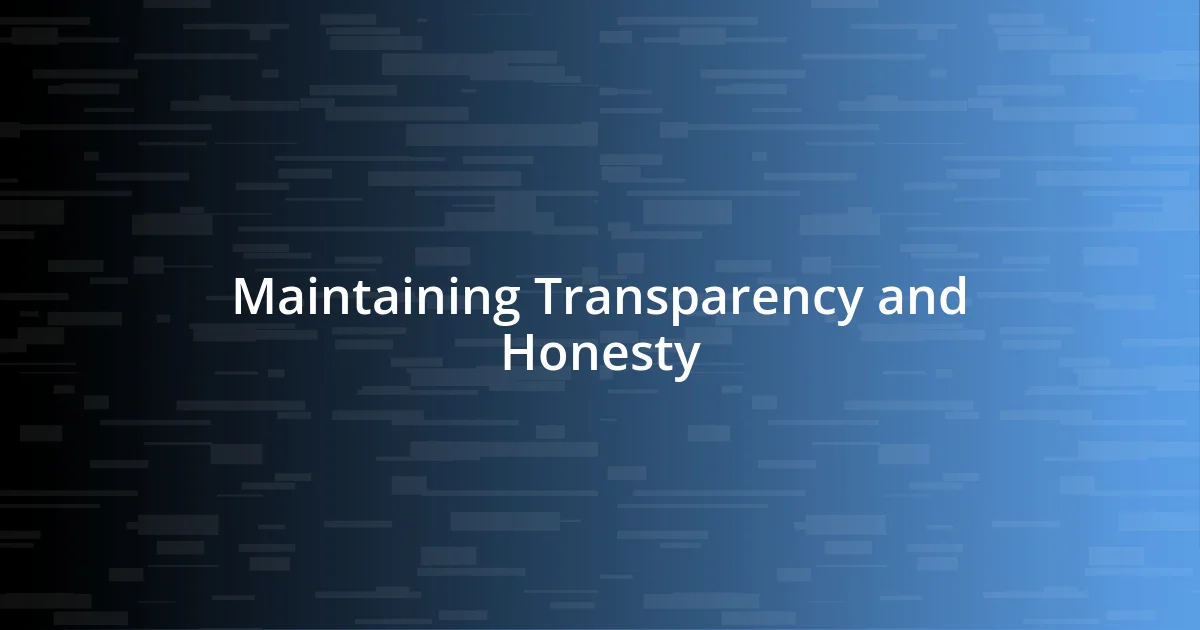
Maintaining Transparency and Honesty
Maintaining transparency and honesty not only establishes credibility but also nurtures lasting relationships. I recall joining an online subscription service that clearly outlined its billing practices and procedures before I signed up. This straightforwardness was refreshing, as it felt like the company was inviting me into a genuine partnership instead of trying to pull a fast one. It reminded me how vital it is for businesses to present their policies in a manner that’s easy to understand.
- Sharing detailed product information helps customers make informed choices.
- Being forthright about mistakes shows accountability and builds trust.
- Responding openly to customer feedback creates a sense of community.
When I think about the brands that have won my trust, I can’t help but mention a local business that recently had a hiccup with product availability. Instead of dodging the issue, they sent out a heartfelt email to their customers, explaining the situation and detailing their steps to rectify it. That kind of honesty not only reaffirmed my faith in them but also made me feel like a valued part of their story. It’s those moments of sincerity that transform a simple transaction into a loyal relationship.

Engaging with Your Audience Consistently
Engaging with your audience consistently is essential in building that elusive trust. I remember when I started a small blog about my travel adventures; I made it a point to reply to every comment left on my posts. It wasn’t just about engagement for me; it was about creating a dialogue, and there’s something incredibly rewarding about knowing you’re connecting with someone who shares your interests. Have you ever felt that spark when someone responds to your input? It’s like an instant bond forming.
Another personal experience that stands out is when I decided to host a weekly live Q&A session on my social media. Initially, I was nervous about putting myself out there. However, the real-time interaction I had with my followers was exhilarating. They not only asked questions but also shared their own stories, which strengthened our relationship. Consistency in this engagement made my followers not just an audience, but a community. Isn’t it inspiring to witness the growth of connections over time?
One aspect that I think is often overlooked is the importance of sharing updates, even when things aren’t perfect. I’ve noticed that being transparent about challenges encourages dialogue. For instance, when my travel plans were derailed by unforeseen circumstances, I shared that experience with my followers. The responses I received were overwhelmingly empathetic, and it turned what could have been a lonely moment into a shared journey. How often do we think about the strength we gain from our vulnerabilities? This consistent engagement molds our relationships into something truly heartfelt.
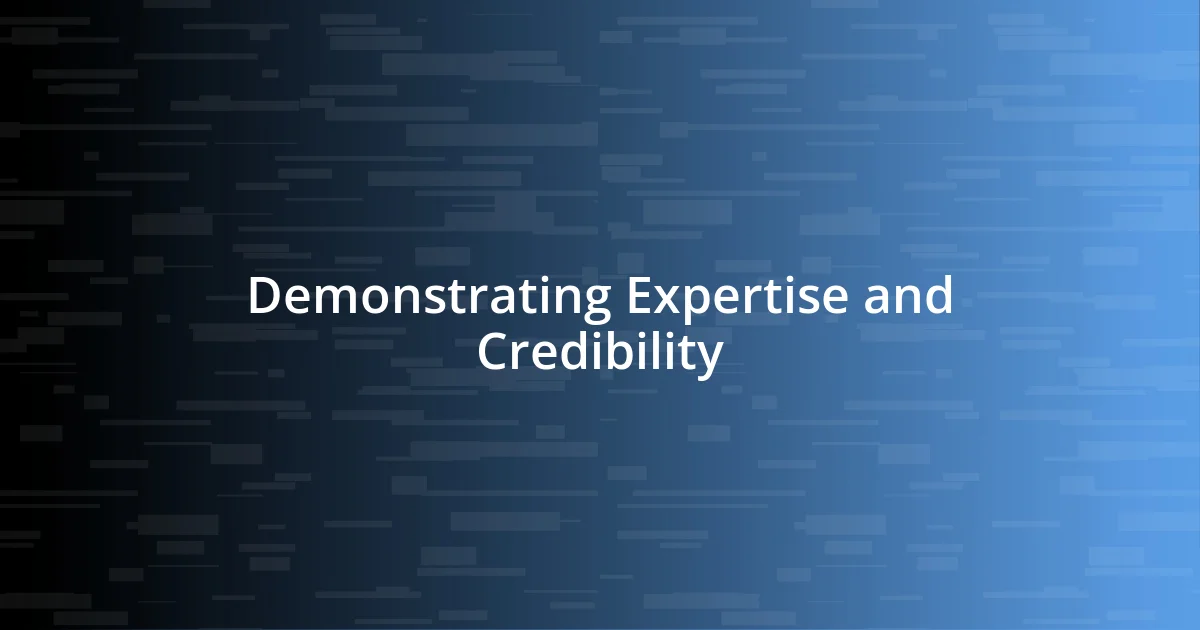
Demonstrating Expertise and Credibility
Demonstrating expertise and credibility often goes beyond just presenting knowledge; it’s about sharing real-world experiences that resonate with your audience. I recall hosting a webinar where I shared insights from my career journey. The feedback I received was incredible—people appreciated not just the information but the authentic stories I wove into the topics. It made me realize how powerful vulnerability can be in establishing credibility. Have you noticed how personal anecdotes can create a connection that mere facts can’t?
Another effective approach is showcasing your work through testimonials or case studies. A while back, I collaborated with a local nonprofit, and after implementing some strategies, their fundraising doubled in just a few months. When they shared their success story, it wasn’t just a win for them—it reflected my skills and built trust. Seeing the impact of your expertise can make it more relatable and trustworthy. Doesn’t it feel great when others validate your abilities?
Finally, keeping your knowledge up-to-date is crucial. The digital landscape is constantly changing, and staying relevant is part of showing you care. I make it a habit to enroll in online courses regularly. While some might see this as tedious, I see it as an investment in my credibility. How often do we stop and consider that continual learning is a sign of commitment to our audience? Embracing this mindset not only enhances my expertise but solidifies trust with those who look to me for guidance.
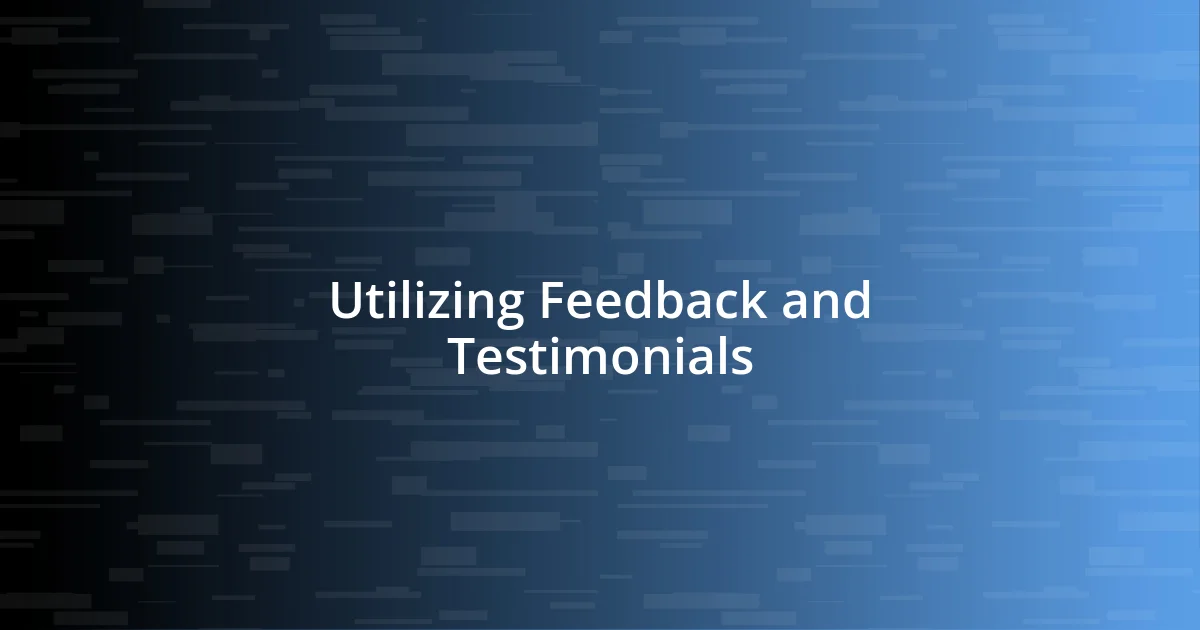
Utilizing Feedback and Testimonials
Utilizing feedback and testimonials has become a cornerstone of my online presence. I once received a heartfelt message from a reader who had implemented some advice from my blog and saw significant changes in their life. Their words not only validated my efforts but also encouraged me to keep sharing my journey. Isn’t it amazing how a simple thank-you can fuel your passion and inspire others?
I also like to feature testimonials prominently on my website. After a recent workshop I conducted, several participants wrote glowing reviews that captured their transformations. By displaying those testimonies, I created a sense of trust and credibility. It’s like having a virtual cheerleading squad that not only vouches for my expertise but also resonates with newcomers. Have you ever considered how powerful it is when others speak on your behalf?
Incorporating feedback into my content strategy has been another big win. After asking my audience what they wanted to learn more about, I was surprised by the response: it was all about practical application. I adjusted my content accordingly, and the engagement skyrocketed. The dialogue that emerged felt enriching and collaborative. Doesn’t it feel rewarding to know that your audience’s needs are being met, cultivating a deeper relationship built on trust?
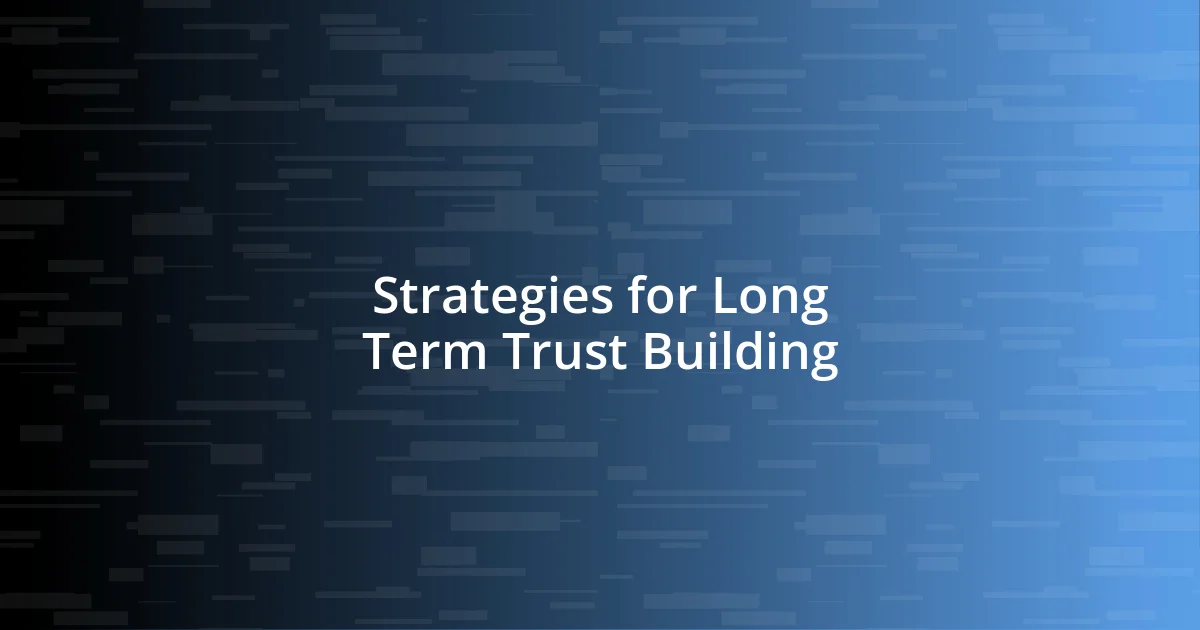
Strategies for Long Term Trust Building
One of the most effective strategies I’ve discovered for building long-term trust is fostering genuine relationships with my audience. I remember reaching out to a few followers through direct messages to thank them for their support. The responses I received were incredible; some shared their stories and challenges, and it created a beautiful sense of community. Have you ever taken the time to connect personally? It’s amazing how those small, sincere gestures can translate into deep loyalty.
Consistency in communication is another key strategy. I’ve made it a point to publish my newsletter regularly, and over time, I noticed that my readers began to anticipate my updates. It’s like I’m checking in with friends – and it really does feel that way! There was one particular week where I almost missed sending it out, and I received messages from readers asking if everything was okay. That level of concern truly warmed my heart. Doesn’t it feel rewarding when your audience genuinely cares about what you’re sharing?
Lastly, transparency is vital for building enduring trust. Recently, I had a project that didn’t go as planned. Instead of burying it under the carpet, I chose to share the lessons learned with my audience. I wrote about what went wrong, and to my surprise, many found the experience relatable. My willingness to be open about my missteps fostered an even stronger connection with my followers. Have you considered how vulnerability in sharing failures can strengthen your trustworthiness? It’s a powerful reminder that we are all on a journey, learning together.






